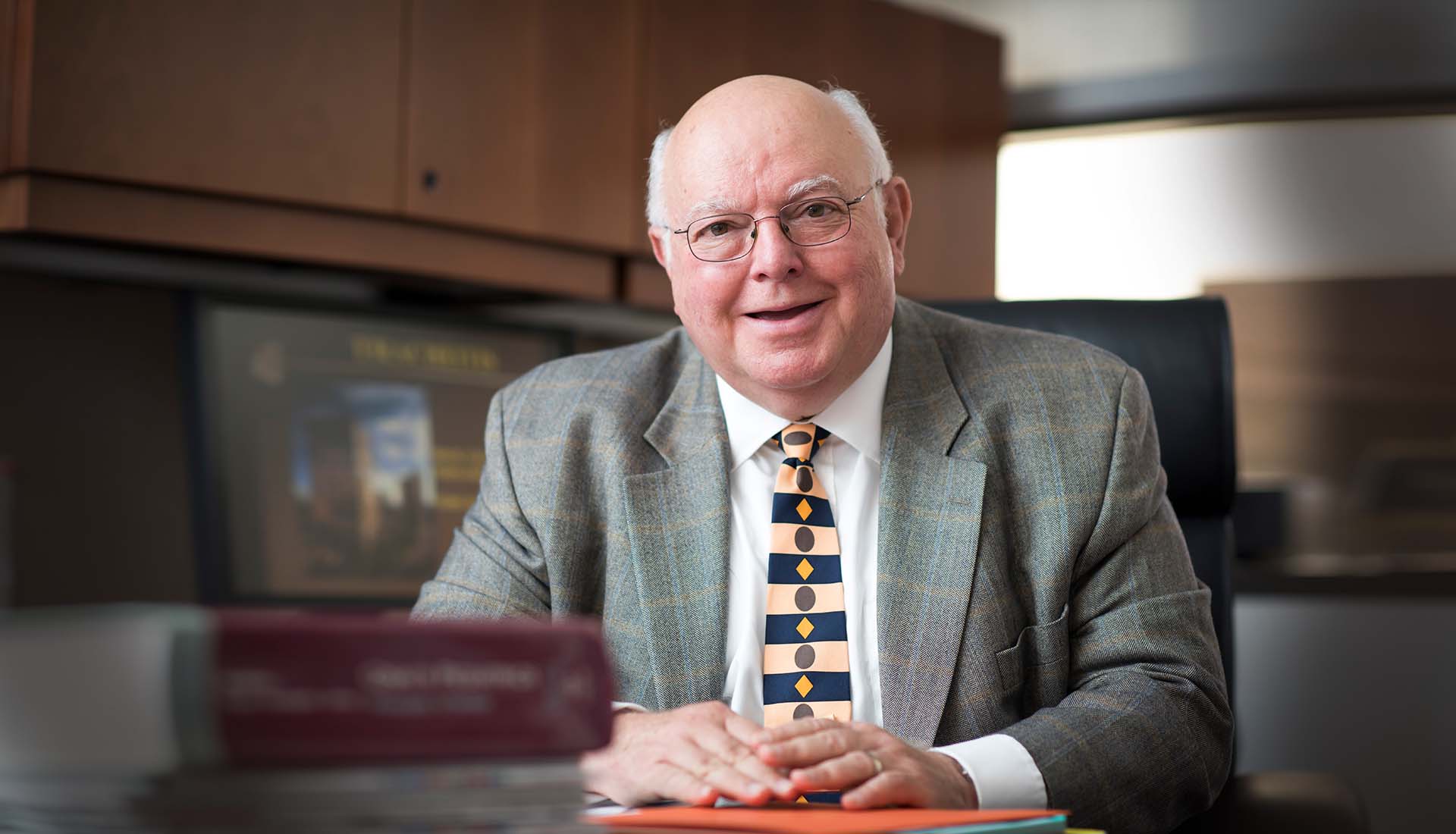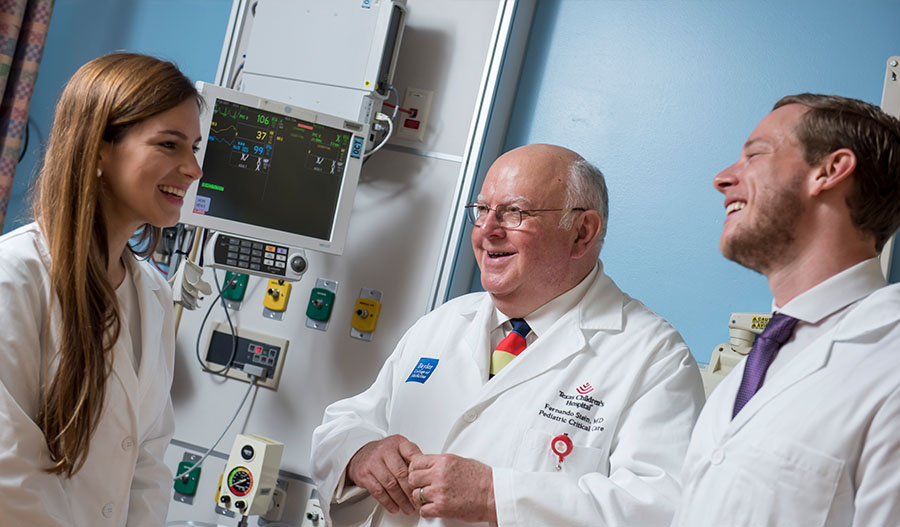

When Fernando Stein, MD, was a child in Guatemala, his father died, leaving a widow and five children under 16-years-old. The family pediatrician, Gustavo Castañeda Palacios, MD, made sure the family would always have medical care – at no charge.
“I was impressed and intrigued by the way he treated us, and from there on, I never looked in any other direction,” Dr. Stein said of his inspiration to become a pediatrician.
Some might say that destiny led Dr. Stein’s professional journey. Dr. Castañeda Palacios had trained in pediatrics at Washington University in St. Louis. There he met Russell Blattner, MD, who later became the first physician-in-chief at Texas Children’s Hospital and the first chairman of the Department of Pediatrics at Baylor College of Medicine.
In 1971, while Dr. Stein was a student at the University of San Carlos School of Medicine in Guatemala, Dr. Blattner and Buford Nichols, MD, who was head of Nutrition and Gastroenterology, invited Dr. Stein to do an elective at Baylor.
“I fell in love with the place,” Dr. Stein said.
He returned for his pediatrics residency in January 1976. He was the first fellow in Critical Care and he never left. Now a specialist in pediatric critical care, Dr. Stein is associate chief of Critical Care (Faculty Development) at Texas Children’s and professor of pediatrics at Baylor.
In collaboration with Larry Jefferson, MD, professor of pediatrics-pulmonary at Baylor and Texas Children’s, Dr. Stein established the Progressive Care Unit in the 1980s as a four-bed intermediate care unit. The children in this unit, now called the Transitional ICU, have complex medical care needs and often are dependent on technology, such as breathing support or a feeding tube.
“As mechanical ventilation and other methodologies started producing better outcomes, the number of survivors of intensive care started increasing. But with this survival came a list of associated disabilities. We called the unit progressive care because children were progressing toward re-establishing their life in their community and their family,” Dr. Stein said.
The intent was to create a system that would reintegrate children to their life to the maximum of their potential.
“We needed a special team of people who understood that transition from very critical care to not-so-critical care to care that can be managed by the family back home, sometimes with important technological dependency. And the families needed to learn how to manage that at home.”
The Transitional ICU has since grown to more than 1,600 admissions per year. More than 1,300 residents have rotated through the unit since its inception.
 Fernando Stein, MD, teaches the art and science of medicine to future physicians.
Fernando Stein, MD, teaches the art and science of medicine to future physicians.
In addition to his work at Texas Children’s – before the COVID-19 pandemic paused international travel – Dr. Stein returned to Guatemala several times a year to teach and deliver medical care. Dr. Stein, along with Gerardo Cabrera-Meza, MD, associate professor of pediatrics-neonatology at Baylor and Texas Children’s, and some entrepreneurs in Guatemala, founded the Dr. Gustavo Castañeda Palacios Hospital in memory of their professor of pediatrics and Dr. Stein’s childhood pediatrician. The facility provides preventive and curative medical care to children in an impoverished area.
Committed to the health of children around the world, Dr. Stein served as president of the American Academy of Pediatrics (AAP) in 2017. An organization of 70,000 pediatricians, AAP is a world leader in defining care policies from setting the vaccination schedule to recommending treatments for specific diseases to addressing social issues that affect children’s health.
“When it comes to a lot of the hot issues in society, like the care of the immigrant child, there are nearly 70 million people in the world that tonight are not sleeping in their homes, in their beds, because they have had a forced migration, from war, from famine, from poverty. Of that group of 70 million people, 51 percent are under the age of 18. So they are children. And that is the business of pediatricians,” Dr. Stein said.
“The American Academy of Pediatrics is not a political organization. It has never taken a political position, endorsing any particular candidate or group. But it is political in that it is unabashedly pro-children. We are about defending the rights of children,” he said.
To advocate for Congressional reauthorization of the Children's Health Insurance Program during his term as AAP president, he led the formation of what was called the group of six, bringing the AAP together with the American College of Obstetrics and Gynecology, the American Academy of Family Practice, the American Osteopathic Association, the American College of Physicians and the American Academy of Child and Adolescent Psychiatry. In all, they represented almost 700,000 out of about a million physicians practicing in the U.S.
The Children's Health Insurance Program was reauthorized for 10 years during Dr. Stein’s tenure.
Other battles in which Dr. Stein believes the AAP must fight include the rights of minorities and religions, gender issues, border policies, accessible and affordable health care, and care for the caregivers.
“These are causes that have made me move in the direction of trying to help, instead of the direction of complaining. Complaining is easy; doing something is what we need,” he said.
An honorary member of 14 international medical societies, Dr. Stein has received three honorary doctorates and more than 30 national and international honors and awards. Among his awards are the Distinguished Career Award from the AAP and the Barbara and Corbin J. Robertson, Jr. Presidential Award for Excellence in Education, Baylor’s highest award for faculty educational service.
Three principles continue to guide Dr. Stein’s career.
“The first one is that serving is a privilege. Who among us would rather need to be served than being able to serve?” he said.
“The second one is that the biggest privilege a human being can receive is when a family comes to that person, in this case, a physician, me, and says, ‘Can you please take care of my child?’ That is an honor bigger than any diploma or any recognition one can receive. That’s a huge honor and responsibility that I take very seriously every day.
“The third one is when young men and women come to us and say, ‘Here I am to train, to learn the science and art of medicine with you.’ And that’s another honor that carries a serious commitment, to shape the knowledge and dedication of the future physicians. That’s something that we need to take with almost religious devotion.”
Even with Dr. Stein’s dedication to his career, he finds time for his family – wife Vilma, daughter, son-in-law and two grandchildren – and for hobbies – photography, magic and dancing.
“I am still enjoying the practice of medicine every day, serving families, serving learners, serving society every day. And I have announced that I will be retiring three years after I’m dead,” he said, with characteristic charm.
President, 2017
Founding or original member:
Member: